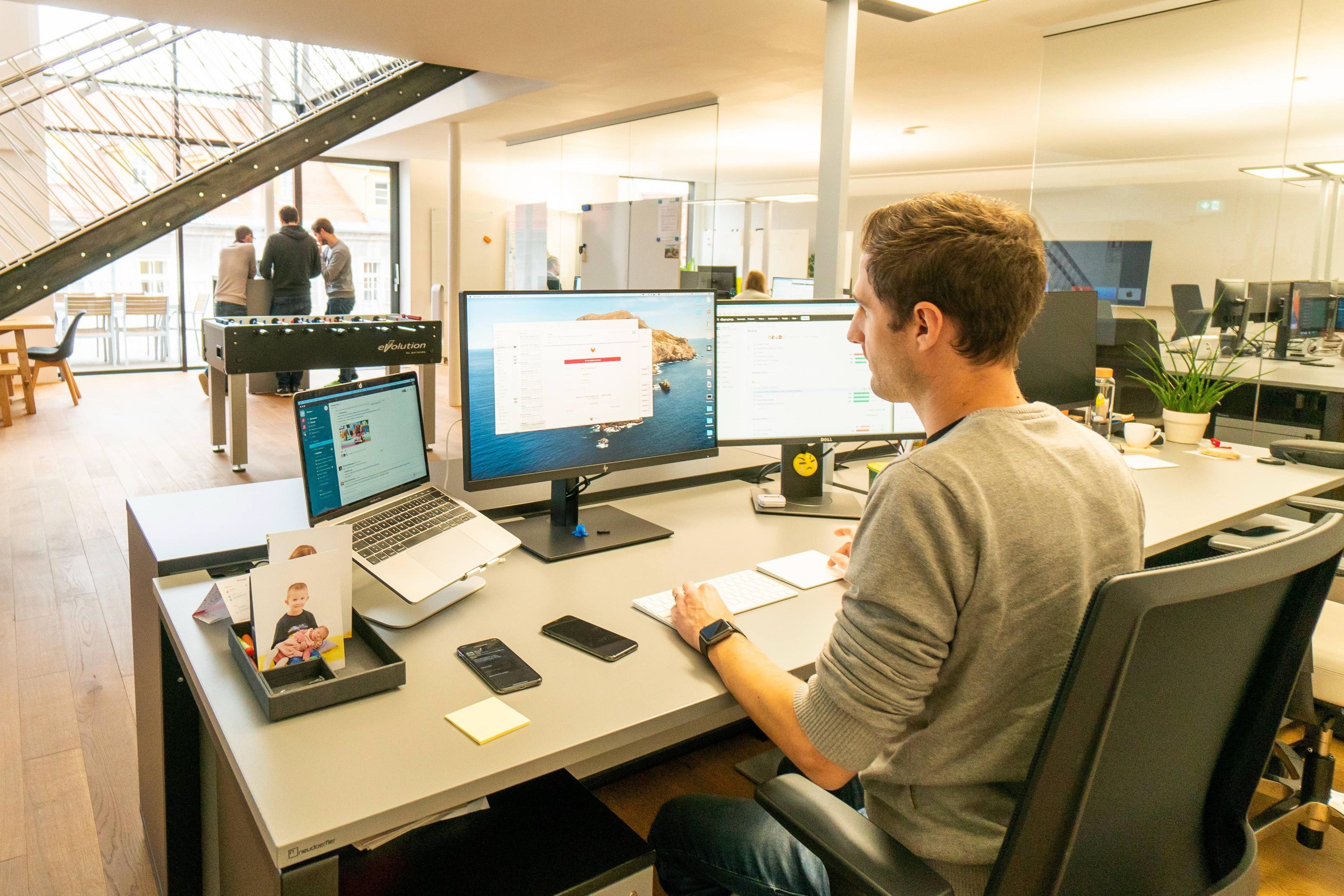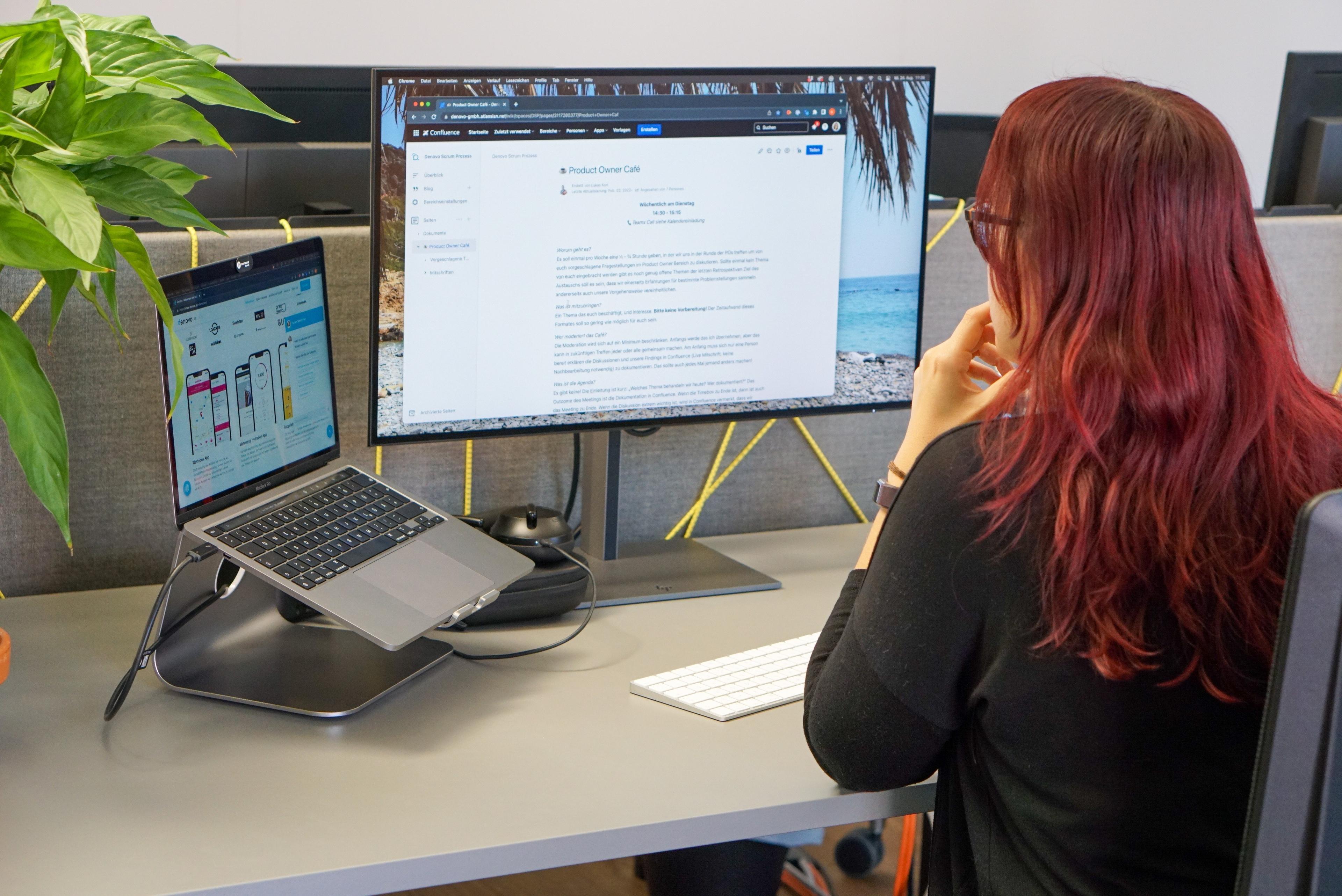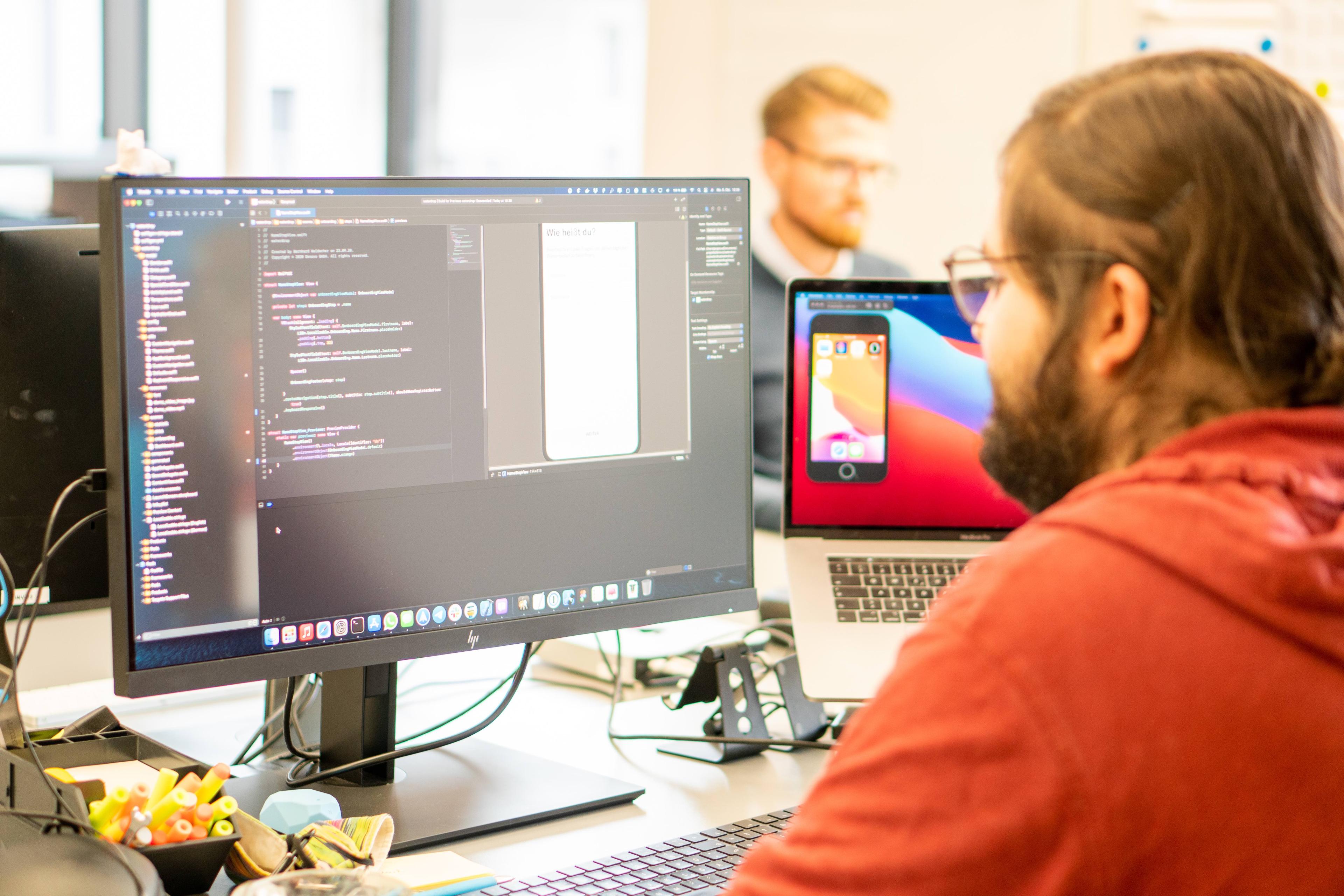Interviews
/
14 Σεπ 2022
Part 1 - What does a managing partner do at Denovo?

In the first part of this interview series, we asked Mattias Rauter, Managing Partner at Denovo, a few questions. He is responsible for the Tech team and told us about his responsibilities in HR management. We also found out what makes working at Denovo so special.
Team
What is your role in ongoing development projects?
As CTO, I am responsible for making architectural decisions for our projects. Sharing ideas with the team is crucial here, as the technology selection is a critical one for the overall project progress. As I already have several years of experience in this area, I am now happy to take on more of a mentor role here. This leads to an empowerment of the whole team and valuable input from all sides. I also shape the framework conditions for our quality assurance so that we can deliver the highest level of quality to our customers despite growth. In addition, I am also involved in the topic of resource planning, in order to be able to plan from a company perspective in the medium and long term, in addition to short-term sprint planning.
"I am particularly proud of the cohesion and great helpfulness in the team. In the daily work, you can sense the joy of each individual working together to solve a problem. This approach is a boost to motivation."
How big is the dev team? How is the team made up, broken down into functions?
Our young dev team currently consists of about 13 software developers, product owners, a designer, and a scrum master. The exciting thing about Denovo is that hybrid positions still exist here as we grow, and people can also take on cross-functional roles depending on their skillset. Also, each individual developer in the team, whether their specialization is in web/backend, iOS, and Android development, has the opportunity to develop for different platforms and build new skills. Although the team is still relatively small, we are already very well organized and have created a meaningful amount of structure.
How is your team organized and for what reason did you decide on a particular organization? What are the advantages?
We work with the scrum method in two-week sprints. When there were three of us at Denovo in the beginning, we worked together in a way that felt natural to us. Suddenly, we realized that we were living the agile approach quite automatically. As we grew, we added the necessary structures to our processes and thus implemented scrum more strongly. I see the particular strength of our way of working in the fact that much of the work can be planned and I can still react relatively quickly to changes from outside and make customer-oriented adjustments. In addition, not only does the customer product continuously improve as a result, but the process itself also undergoes constant evolution. One of the principles of SCRUM also contributes to this open communication throughout the team on all topics. Everything that can bring about constructive change is voiced.
What makes your team special compared to other teams?
I am particularly proud of the cohesion and the great willingness to help within the team. In our daily work, you can feel the joy of each individual person working together to solve a problem. This approach is a boost for motivation. In my life, I have dealt with people who focus on the problem instead of what the world would look like without it. In addition, all team members bring enthusiasm for new technologies. This is not limited to topics used in development. For example, the entire team meets regularly after work to stream events together (such as a Google IO or an Apple keynote) to gain new ideas and inspiration.
Recruiting
How is the Dev department integrated into the recruiting process?
We have a multi-stage application process, which in our experience leads to a successful result on both sides. I usually conduct the initial interview with potential developers in order to clarify the general conditions and technical requirements. During the interview, I also bring in an existing developer from the area of expertise we are looking for. The two of them can then delve deeper into the technology and talk openly about the position and the way of working. In the second round, the entire team is invited to a relaxed discussion. We, as well as the applicants, get a very good feeling for each other. I also always make the subsequent decision together with the team. In the past, this has led to a great, organic structure where everyone feels comfortable in the long term.
"I also always make the subsequent decision together with the team."
Is there a specific procedure for new colleagues? How are they integrated?
We rely on the buddy system. New developers are assigned a "buddy" from the existing team. This person knows all the internal processes and also provides support with technical questions. This way, new employees are integrated from day 1. In addition, they receive the "Welcome Map", where the most important information is available at a glance. All guides are also available digitally on Confluence and are constantly being expanded and improved. Other tools such as 1Password or Slack support the uncomplicated sharing of sensitive access data, as well as "GIF-laced" communication within the team.
Besides the professional qualifications, what else do you value when looking for developers for your team?
We are looking for team players who want to take responsibility for their tasks and who are fully committed to implementing them in their own time. This also includes openness to criticism and the ability to express criticism yourself. It is also crucial that requirements are not implemented blindly. We encourage our customers to question and to present their own, perhaps even better, approaches to solutions.
Technologies
What technical challenges are you currently facing?
In general, we are exposed to a constant change in technologies. While three to four years ago we were doing Java development, today JavaScript or Node.JS are on the agenda. There is also a trend towards more microservice and serverless architectures. While this makes systems more agile, it also makes them more complex to communicate with than traditional systems. In the mobile app area, there is also a pronounced short-livedness. The regular operating system updates are also changing the approach to how apps are consumed. For example, iOS 14 suddenly brought the topic of widgets to the fore. Now we have to think about which customer benefits we can create with which information provision here.
"I think that in a few years we will consume software in a different way. We will break away from apps that are physically installed on a device, like a smartphone."
What technologies are you working with?
Currently, on the backend, we work with Node.JS, Java Spring/Play and Firebase Cloud Functions. API development is done with REST or GraphQL. We map the web development in the frontend using React. In the area of databases, we primarily use MongoDB, PostgreSQL, TimescaleDB and MySQL. For mobile apps, we rely heavily on native development to take full advantage of the respective ecosystems and to ensure that the respective design specifications of Android and iOS are met. Therefore, Swift and Kotlin are in use here. With Gitlab CI/CD, we create the structured basis for the development process, testing and deployment.
How has the company's technology changed since its founding?
Besides the technological change in actual software development mentioned earlier (away from Java, towards Node.JS, MongoDB, etc.), not that much has changed at our company. We have always used tools like Jira for ticket handling and Slack for communication. What has changed is that we have structured our channels and ways of working better, which allows us to work very efficiently in a larger team.
What trends in software development do you see coming your way?
I think that in a few years we will consume software in a different way. We'll move away from apps that are physically installed on a device, like a smartphone. Whether it will be glasses or some other type of wearable that will be the dominant device, I can't estimate, but the place where software needs to be available will definitely change. Customers
Denovo develops custom solutions for the industrial and consumer markets. Give us an insight into your customers.
Across the board, our customers are very innovative and they want to actively drive a change in their processes or business model. To do this, they are looking for a partner who will walk the journey with them and not just implement a requirements document. Our customers place great trust in our digitization expertise and share their vision with us. We at Denovo then make the right decisions around processes and technologies to realize this vision together. This is also reflected quite strongly in our agile contract framework.
"Always be open to new things and don't rest on what you already know!"
What is the advantage of custom software for developers?
The advantage lies in the variety. Sometimes you're working on a project that turns the circular economy on its head, and sometimes you're accompanying a completely new lifestyle product during its digital market launch. Our team draws new motivation from this every day and there is never a habitual rut.
You have worked as a developer yourself. What tip would you like to give to developers out there?
Always be open to new things and don't rest on what you already know!
"Stay hungry!"

